Collagen: A Natural Solution for Joint Pain?
In a hurry? Click here to read the Article Summary...
“The results of this study have implications for the use of collagen hydrolysate to support joint health and possibly reduce the risk of joint deterioration in a high-risk group.” – 24-Week study on the use of collagen hydrolysate as a dietary supplement in athletes with activity-related joint pain
Americans are in pain, and a large percentage of this pain comes from weakness and deterioration in the joints. According to the National Health Interview Survey conducted by the Centers for Disease Control (CDC) back in 2006, 30% of all adults in the country experienced some form of joint discomfort over the previous 30 days [1]. Knee pain, or osteoarthritis, was the culprit for 18% of the respondents, followed by shoulder pain (9%) and hip pain (7%).
If you or a loved one fall into this category, you need to know there are many things you can do to alleviate the pain and discomfort in your joints – without having to resort to pain meds (which only mask the problem). One huge step in the right direction is to up your collagen levels, as collagen can work to lubricate and fortify your joints on all levels.
Studies Show: Collagen Supplementation Helps Joint Pain in Athletes
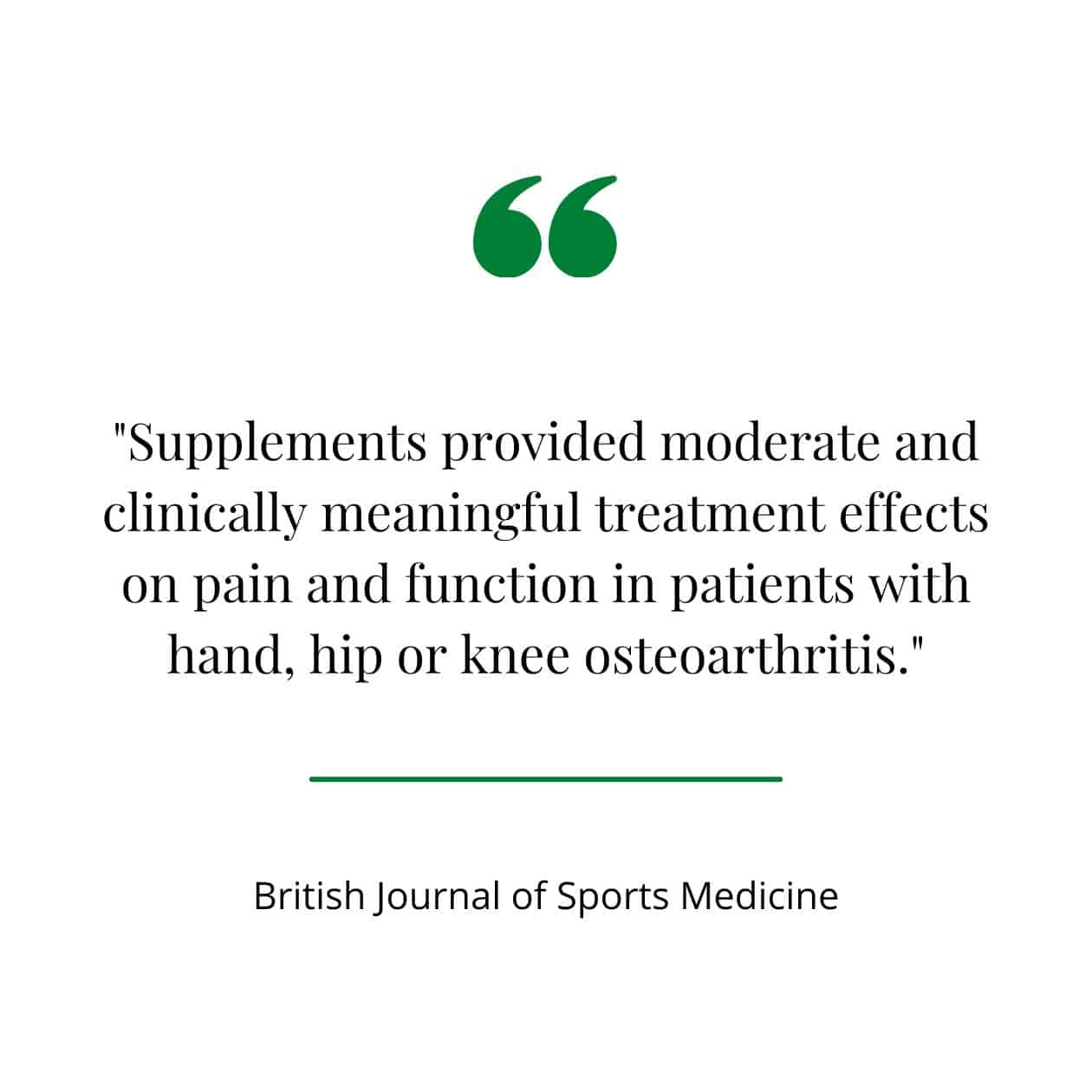
Image source: Dietary supplements for treating osteoarthritis: a systematic review and meta-analysis
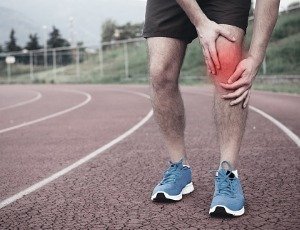 If you love your morning jog, this is especially important information. Did you know that the condition called “Runner’s Knee,” otherwise known as patellofemoral pain syndrome, affects one in four physically active people? What’s more, if left unchecked, patellofemoral pain syndrome can lead to patellofemoral osteoarthritis–and excruciating pain.
If you love your morning jog, this is especially important information. Did you know that the condition called “Runner’s Knee,” otherwise known as patellofemoral pain syndrome, affects one in four physically active people? What’s more, if left unchecked, patellofemoral pain syndrome can lead to patellofemoral osteoarthritis–and excruciating pain.
Of course, this doesn’t mean you have to stop exercising by any means! Science is discovering what causes Runner’s Knee in the first place [2] and what you can do about it.
Recommended go-to strategies include:
- Changes in posture
- Losing weight
- Doing targeted stretching routines
- Eating an anti-inflammatory diet
Plus, as mentioned earlier, upping the collagen level in the body.
The link between collagen levels and knee pain alleviation in athletes has been verified by science, and it just makes sense. Most athletes work their bodies hard. Especially if you are a “weekend warrior,” it might not take much to overdo it and end up injured. Up to 90% of all of our tendons, cartilages, and ligaments are made from collagen, especially Type II, which is often called “cartilage collagen.”
At the same time, as far back as the 1970s, studies found a correlation between aging and lower collagen production as well as greater malfunctions in the way collagen molecules work in the body (a process known as “crosslinking” [3]). Collagen deficiencies as we age show up first in the skin [4], but it also affects joints, cartilage, bones, and even internal organs.
If you are a physically-active person over the age of 30, you have more of a reason to pay attention to your collagen levels. But even if you are still part of the “under 30” crowd, ignoring that knee pain after a run could lead to cartilage breakage and disability in the long run for you, too.
The evidence is out there as to how upping your own collagen levels can help.
One of the most cited studies to date is from researchers at Penn State University in 2008. In this clinical trial, 147 relatively healthy male and female collegiate athletes with no signs of joint disease, but who occasionally experienced joint pain, were divided into two groups.
The first group received a collagen hydrolysate supplement for 24 weeks. The other received a placebo. Collagen hydrolysate is a type of supplement where collagen molecules are broken down into peptides (small groupings of amino acids) for better digestion and absorption.

The results of the study indicated that the individuals who consumed the collagen supplement had reduced pain and inflammation and increased mobility compared to those who did not.
According to the study investigators, “The results of this study have implications for the use of collagen hydrolysate to support joint health and possibly reduce the risk of joint deterioration in a high-risk group.”
Drinking bone broth on a regular basis is another go-to strategy for soothing Runner’s Knee. Making a broth from organic, grass-fed beef or chicken bones ensures you are getting a lot of collagen in your diet (in the form of gelatin, which is what collagen morphs into when it is cooked) as well as many other nutrients. This includes glucosamine, chondroitin, hyaluronic acid, and essential minerals that all work in synergy with collagen for vitality and health of the whole body.
Can Collagen Help With Osteoarthritis?
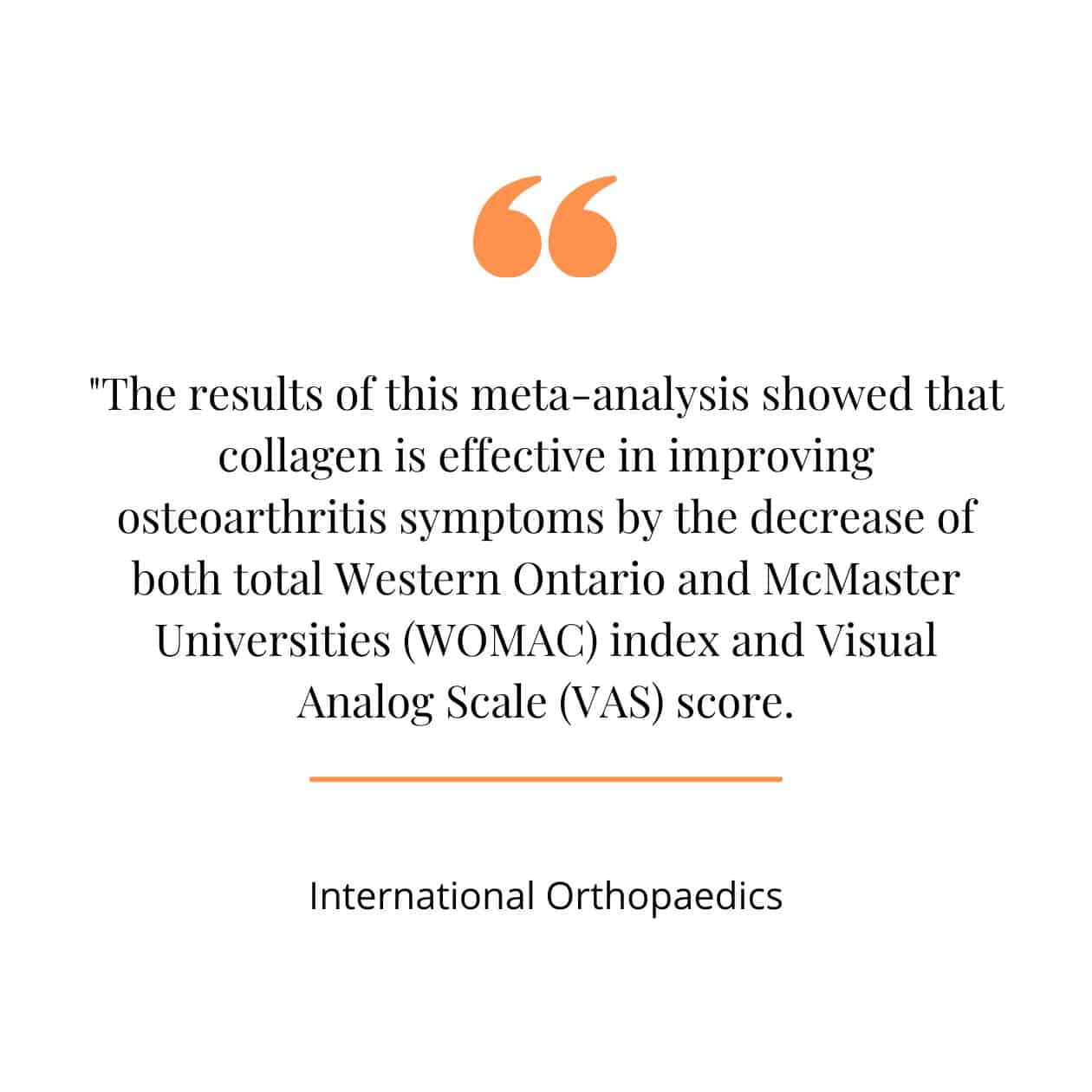
Image source: Effect of collagen supplementation on osteoarthritis symptoms: a meta-analysis of randomized placebo-controlled trials
An estimated 27 million Americans have osteoarthritis (OA) [5]; that’s about eight percent of the U.S. population! Osteoarthritis is defined as “inflammation of the joints” and is considered a degenerative disease that causes the breakdown of cartilage in between the joints.
Osteoarthritis can affect any joint in the body, but the most common is osteoarthritis of the knee. If you are among those who suffer from any form of osteoarthritis, then you know how devastatingly painful it can be!
In the most severe cases, joint replacement surgery is the best option for osteoarthritis. This may be avoided, however, if action is taken early. Again, eating an anti-inflammatory diet can help, according to the Arthritis Foundation [6]. So can stretching, losing weight to put less stress on the joints, and reducing stress [7].
According to the latest studies, targeted collagen supplementation can also help to ease the swelling, pain, and stiffness associated with OA. A large-scale meta-analysis sponsored by the University of Sydney in Australia concluded that collagen supplementation was more successful than any other supplements they studied at reducing pain in osteoarthritis patients [8].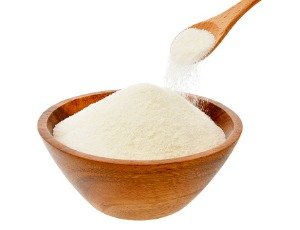
Another study published in Nutrition Journal 2016 [9] found that after 180 days, those who took a specific collagen Type II supplement experienced significantly better relief from pain, stiffness, and function than the placebo group and a slightly higher level of comfort than those who took a chondroitin supplement.
These studies are just the latest in a long list of investigations that have hinted to the power of natural substances to help with the pain and discomfort associated with this condition. An investigation done by Case Western Reserve University School of Medicine over 25 years ago suggested that nutraceuticals such as glucosamine, chondroitin sulfate, and collagen hydrolysate may have efficacy for pain equal to that of NSAIDs (nonsteroidal anti-inflammatory agents) – minus the harmful side effects of course [10].
What About Collagen and Rheumatoid Arthritis?
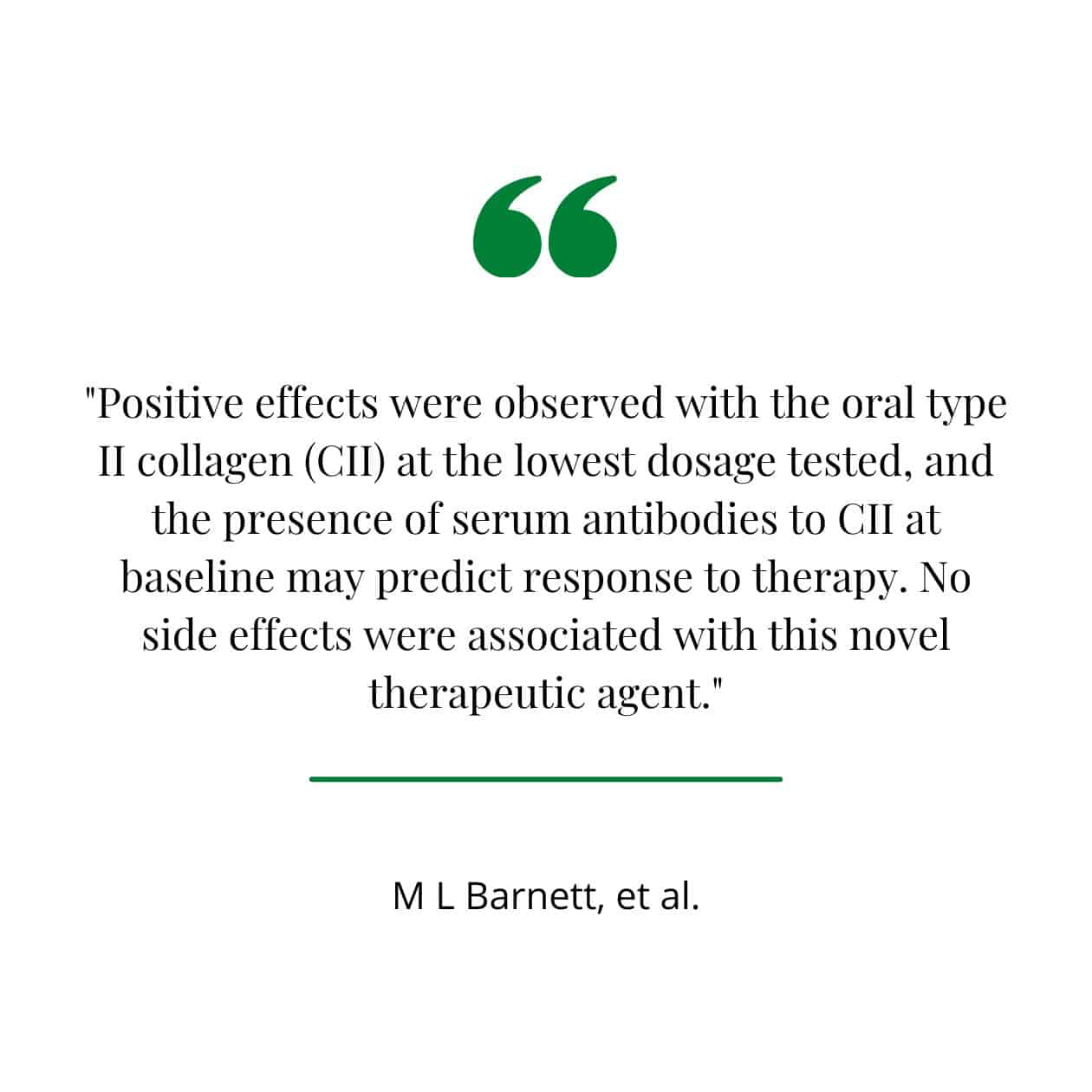
Image source: Treatment of rheumatoid arthritis with oral type II collagen
Rheumatoid arthritis (RA) is caused by an over-activation of the immune system, where inflammation occurs in joint cartilage. Conventional medical wisdom argues that there is a wide difference between osteoarthritis and rheumatoid arthritis. Recent research, however, suggests that RA and OA have a lot more in common than originally thought.
The most important thing that both of these conditions have (and this is shared with most chronic diseases out there in general) is inflammation [11]. For RA and OA both, inflammation occurs in the joints and this leads to the breakdown of cartilage. Collagen has been found time and time again to help reduce inflammation in both RA and OA conditions.
In fact, back in 2000 Nebraska Medical Center researchers found that plain old chicken soup reduced inflammation. How? Something in the soup seemed to detract from certain pro-inflammatory immune system cells from sites of existing inflammation.
At first, the investigators thought that this was caused by the vegetables in the soup, which was a reasonable assumption. As it turned out, however, it was amino-acid-rich chicken broth itself that had such an anti-inflammatory effect [12].
Further research has added validity to the possibility that collagen supplementation may be beneficial for people with both OA and RA. A 2009 double-blind clinical trial involving 500 individuals was published in the journal Arthritis Research and Therapy [13]. It found that an undenatured collagen Type II product improved participants’ stiffness (especially in the morning), pain, joint tenderness, and swelling.
How to Use Collagen to Address Pain Issues
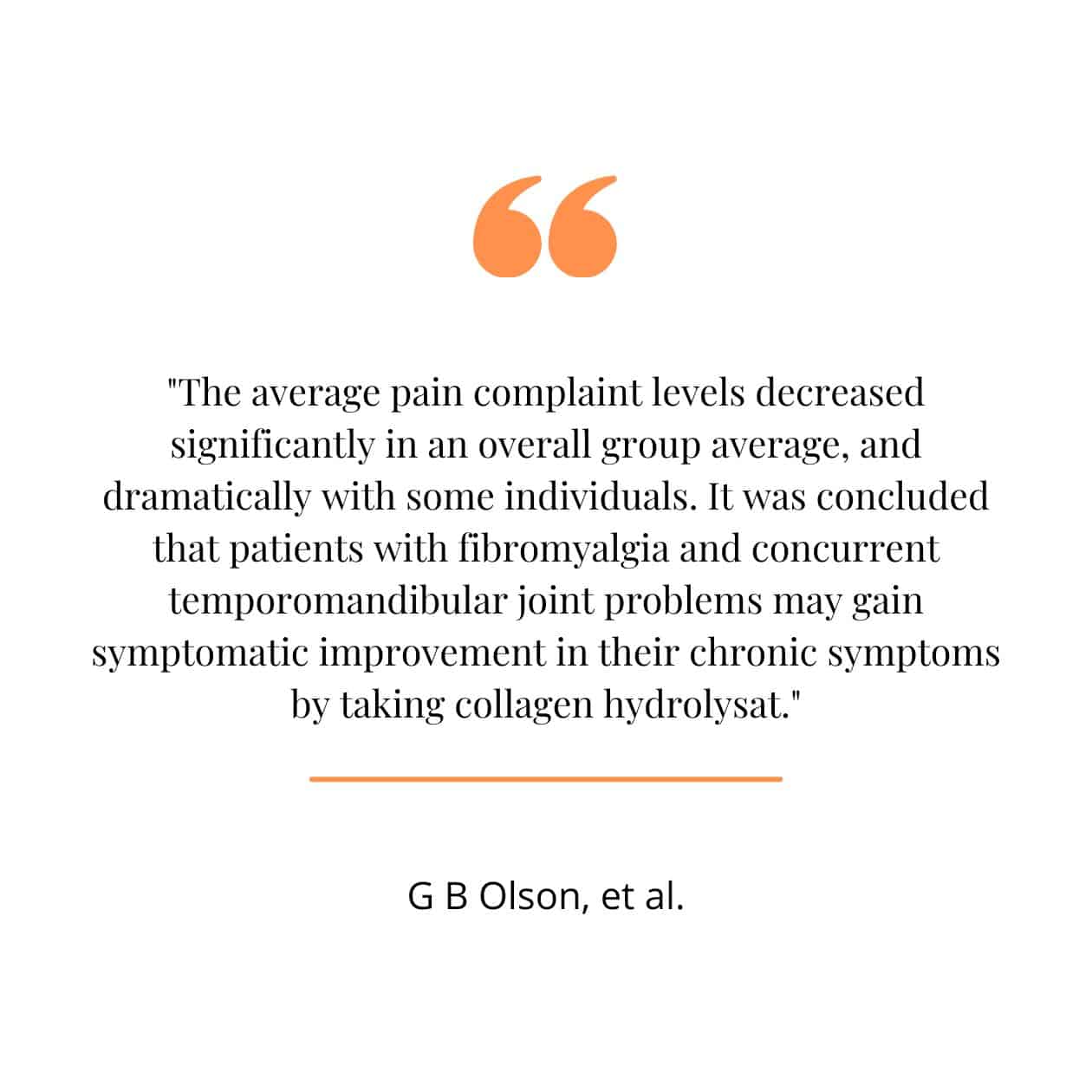
Image Source: The effects of collagen hydrolysat on symptoms of chronic fibromyalgia and temporomandibular joint pain
With 23% percent of all American adults having some form of arthritis [14] and even more suffering from undiagnosed joint pain such as Runner’s Knee, coming up with solutions is a necessity. Even the National Institutes of Health (NIH) recognizes that conventional ways of addressing pain aren’t working. In a 2015 news release [15] announcing their latest pain findings, the NIH noted:

“Pain is one of the leading reasons Americans turn to complementary health approaches such as yoga, massage, and meditation—which may help manage pain and other symptoms that are not consistently addressed by prescription drugs and other conventional treatments.”
The good news is there are actions you can take right now to increase collagen production, no matter what your age.
As always, it is vital that you consult with your trusted health practitioner before beginning any kind of supplementation program. That being said, in study after study, high-quality collagen supplementation has proven effective in helping to reduce both inflammation and pain levels in those who suffer from joint pain.
No matter what, remember that you don’t have to live in pain caused by RA and OA. There are natural solutions that can work.
Organixx Clean Sourced Collagens blend contains five types of collagen from four sources. What’s more, it’s combined with targeted nutrients such as zinc, vitamin C, and vitamin B6 which specifically enhance the bioavailability and potency of collagen. Clean Sourced Collagens is formulated from the ground up to enhance and support your body’s natural ability to heal and rebuild itself from the INSIDE out.

 Sources:
Sources:
Article Summary
Americans are in pain, and a large percentage of this pain comes from weakness and deterioration in the joints.
In a 2006 national survey, knee pain, or osteoarthritis, was the culprit for 18% of the respondents, followed by shoulder pain (9%) and hip pain (7%).
Here are some natural ways to help reduce joint pain:
- Changes in posture
- Losing weight
- Doing targeted stretching routines
- Eating an anti-inflammatory diet
Up to 90% of all of our tendons, cartilages, and ligaments are made from collagen, especially Type II, which is often called “cartilage collagen.”
In study after study, high-quality collagen supplementation has proven effective in helping to reduce both inflammation and pain levels in those who suffer from joint pain.
Check out our Clean Sourced Collagens.


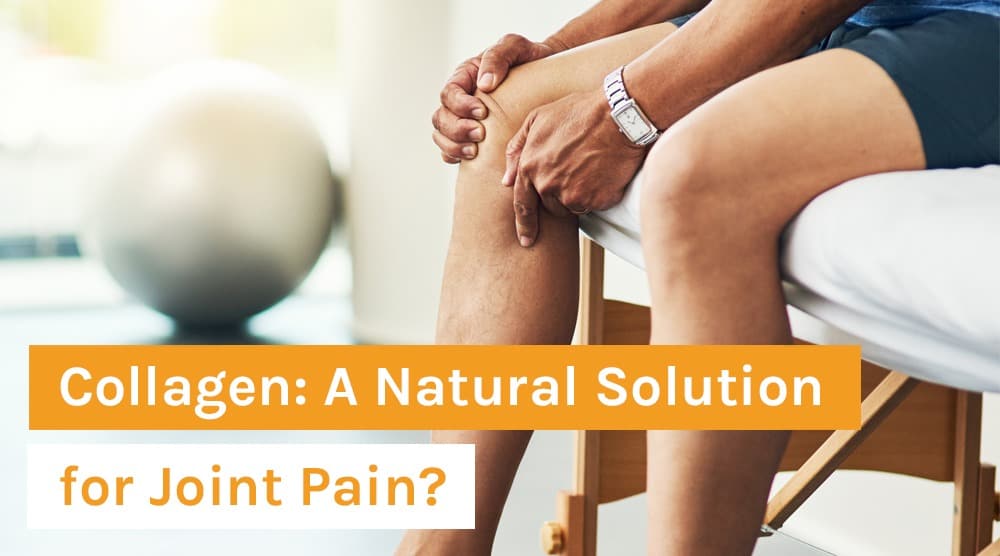


I WANT TO KNOW THE PRICE!!!!!!! I TRIED GETTING A COUPLE OF THINGS BEFORE AND BECAUSE YOU HAVE MY PAYMENT INFOMATION YOU SENT IT ANYWAY!!!!!!!!!! I DIDN'T FINALIZE THE PAYMENT BECAUSE I DIDN'T HAVE THE MONEY WHICH PUT ME IN OVERDRAFT AND COST ME 38.50 EVERY 7 DAYS UNTIL THE 3RD OF THE NEXT MONTH!!!!!!!!!!! IT HAS COST ME UP TO $400.00 IN OVERDRAFT FEE'S BUT SINCE I LIVE ON 1300.00 IT WAS NEARLY HALF MY INCOME!! AS A RESULT WHEN I PAID MY BILLS FOR THAT MONTH (WHICH COME OUT ON AUTO) I WAS STILL IN OVERDRAFT FOR THE NEXT MONTH!!!!!!!!!
Hi Rita, thanks for your comment.
Our Clean Sourced Collagens is priced at $40.00 for a one-time purchase and $36.00 if you subscribe and save.
You can find all the details here: https://shop.organixx.com/products/clean-sourced-collagens
Unfortunately, we weren't able to find any orders under your name and email address. If you haven't done so already, we suggest reaching out to our Customer Success Team so they can look into this for you.
You can send them an email by submitting a support ticket here: https://support.organixx.com/submit_ticket or you can reach them by phone at 1-877-750-6455.
Our normal hours are Monday - Thursday from 9 am - 8 pm ET and Friday - Sunday from 11 am - 5 pm ET (Chats and Emails only). They'll be very happy to help you out.
Please let us know if there's anything else we can help you with in the meantime. We hope you have a wonderful weekend ahead.
Hi I got arthritis in my knee and ankle waiting for knee replacement but not happy about it is there any vegetrain collagen I can take appricate your help
We're sorry to hear about that, Abdul. We appreciate your interest in our Clean Sourced Collagens!
Most collagen brands only provide one or two of the 5 major types of collagen and none of the nutrients your body needs to synthesize (build & use) collagen.
That’s why we include 5 collagen types from 4 ultra-clean sources plus the essential collagen “building blocks” your body needs. In order to deliver everything your body needs, we don’t just use one type of collagen; our Organixx Clean Sourced Collagens contains type 1, 2, 3, 5, and 10.
You wake up a few weeks from today and notice how CLEAN SOURCED COLLAGENS is helping you reduce the signs of aging and see that your skin is smoother… cellulite is going away… and overall your skin looks much younger and more radiant.
You notice that your tummy feels much better than it has in years and you don’t have any uncomfortable gas or bloating after you eat.
Your joints no longer cause you discomfort and you’re able to move and be as active as you used to be “back in the day.”
You sleep better and wake up feeling refreshed and have more energy throughout the day to get things done.
Your hair looks thicker and fuller and you don’t lose as much of it in the shower… and your nails seem to be growing better and healthier.
Best of all, you feel more like YOU … without the fatigue, aches and pains, or the brain “fog” that you used to have.
To add, you are protected when you purchase our products. We totally understand and with there being so many choices out there, how do you know which one to pick? This is why we back ALL of our supplements and products with a 1-year, no questions asked, money-back guarantee. Simply send back the unused portion of the containers (even if they are empty) and we’ll refund all your money back less shipping if shipped internationally!
We hope you find everything informative. Please let us know if you have more questions, we're here to help!
My wife has been taking a scoop of your collagen daily now for over 6 months with no relief from her arthritic knees.
Your comments on why not and if you have any recommendations to improve efficacy
Hi Parviz, thank you for your feedback.
We are sorry to hear that your wife has not experienced pain relief from using the Clean Sourced Collagens.
Many people have seen very positive results with the product, however individual results will vary. We always recommend a consultation with a trusted healthcare practitioner prior to taking any new dietary supplement, in order to determine if taking the Clean Sourced Collagens is beneficial for your wife's health needs.
Please let us know if there is anything else we can help you with. Thank you for being here with us. Wishing you and your wife the best!
I recently bought Turmeric 3D and Organizymes. My sister suffers from Lupus and wanted to know if this will help her and most importantly can these be taken at the same time this 1 capsule each. I would also want to know if you have any other recommendations.
Hello Farayi! Thanks for your question and for your recent purchase of Organixx products.
We are very sorry to hear about your sister and her battle against Lupus.
As we mentioned in your other comment, Organixx researches and develops a broad range of nutritional supplements to assist people in accomplishing a wide range of health goals. Some of our supplements are developed and designed to be taken together, as a system. Others were created for a more specific, targeted health goal.
While most should have no issue consuming all of our nutritional supplements together, it is always a wise step to consult with your primary healthcare practitioner related to your own unique health needs and health challenges.
We hope this helped and we wish everyone around you the best in your health journey!
Which is better for your joints collagen or bone broth or both.
Hi Beverly, thank you for your question.
When it comes to collagen powder versus bone broth powder, the choice is yours as to which one you can and should take. Many experts recommend both, either alternating them or taking them as needed.
We would like to invite you to take a look at this article that discuss Collagen vs. Bone Broth: https://organixx.com/collagen-vs-bone-broth/.
We hope you find it helpful and we wish you a lovely day!